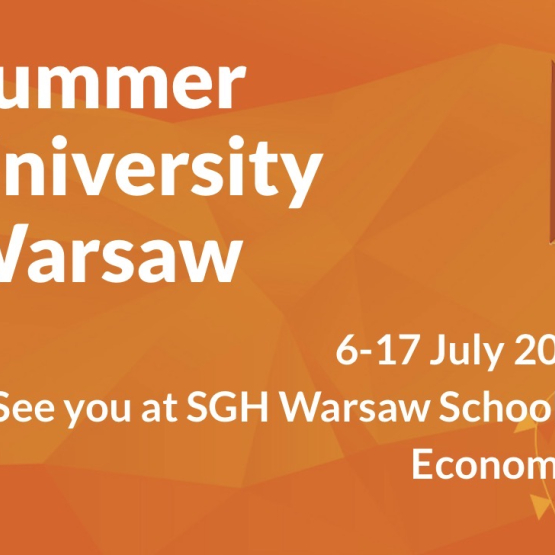
SGH Warsaw School of Economics enjoys a reputation of the best economic university in Poland. To count its accolades may take hours, yet there still exists no prize or title awarded to a university with the most active and engaged students in Poland. I believe SGH should be recognised for having earned such reputation too.
There are over 60 student organisations and scientific clubs (SKNs), which is quite impressive, particularly when compared against other Polish economic universities, frequently complaining about rather subdued student activity outside of student boards or parliaments. An SGH outsider could wonder why it has so many different student associations. The answer may seem blunt, as it comes from a mostly subjective perspective – SGH students are truly exceptional. Those who get admitted never rest on their laurels, on top of working hard to study economic processes and current developments in the economy around, they are determined to pursue own hobbies and passions. This attitude explains why the actively operating student organisations at SGH are so numerous.
Students who have other than economic pursuits usually join scientific clubs or establish new organisations. This has given rise to a wide range of “genres” in student associations – there are those which aim to delve deeper into economic studies, some artistic clubs, local organisations with their units at SGH, special interest clubs or student institutions provided for in the Study Rules and Regulations or University Statutes.
Let us begin with student institutions – the SGH Student Board is the only body that represents the interests of all students of SGH. Every student has a membership of the Student Board, but it is the statutory and project teams that have the most active active engagement. SGH Student Board is also the biggest student association at our university. It enjoys a lot of autonomy and has a significant impact on official decisions issued by other SGH bodies. For example, the Board has the right to approve candidates proposed for the positions of Vice Rector for Didactics and Student Affairs, Deans and Vice Deans of undergraduate and graduate programmes because the proportion of student electors (representing a specific university community and casting direct votes in elections) is one of the largest among other elector groups. The body can issue syllabus reviews and put forward own suggestions. In a nutshell, it has influence on what is taught at SGH and how the process of learning is conducted. The Board also protects student rights and obligations, it comprises the Scholarship Commission and the Disciplinary Commission for Student Affairs. Its statutory scope is wide, yet only a fraction of the actual activity. Most active Student Board members are involved in project work. During an average academic year the SGH Student Board launches over 30 various projects and initiatives for the academic community. These initiatives range from an issue of the Student Information Brochure or Academic Calendar to organising the biggest student charity marathon in Poland or a large-scale mass event like the annual student carnival, the Juvenalia. The scope of tasks undertaken by the SGH Student Board is truly vast, therefore the number of actively participating students, including the executive committee, is estimated at about 300, year on year. Through this organisation, the student community speaks with one voice which is heard by SGH authorities.
Students of SGH are a numerous and diverse group of people united by their interest in business, economics and the economy. We are naturally differentiated, so our university makes room for science geeks as well as artistic souls. The latter are strongly represented on our SGH Choir, the Theater “Scena Główna Handlowa” [“Warsaw Scene of Economics”] or the Song and Dance Ensemble of SGH. Members of these organisations have many times lent class to the celebration of numerous official events at our university. It is virtually impossible to imagine an inauguration of the academic year without the beautiful choir performance, isn’t it? The initiator of a relatively new tradition – Polonaise Dance in the Parachute Hall has been the Song and Dance Ensemble of SGH, and the Theater “Scena Główna Handlowa” has been made famous for its high-level artistic performances.
The Polish Student Association (ZSP) and Independent Student Association (NZS) are also active and visible at SGH. They have their representations at many Polish universities, so SGH is no exception. Their activity consists mainly in project initiatives – Successful Women’s Week, Honorary Student Blood Donation (“Wampiriada”) or NZS Days. These constitute flagship SGH ZSP and SGH NZS undertakings. One should not leave out the CEMS [The Global Alliance in Management Education] Club Warsaw – the only such branch in Poland.
For those interested in global corporations and business at large, great opportunities lie with the student scientific clubs of SKN Consulting and SKN Business. Both clubs are highly popular and rumour spreads wide about their storied recruitment processes. The Marathon of Consulting Firms or Academy of Alternative Investing are the events which attract opulent CV fans or maniacs of non-standard forms of capital allocation.
To some SGH students just a few hours of lectures and classes in Microeconomics or Macroeconomics is not enough. Some fall in love with statistics in their first class, others want to explore the intricacies of finance, energy policies, geopolitics or economics. The strictly scientific organisations cannot be counted even on two hands, and the topics they deal with are magnets for world-hungry SGH students.
Some of the global organisations like ESN and AISEC are also present at SGH. University internationalisation has become a vital purpose nowadays, with these two organisations bringing important contributions to this cause. Recently, The Global Learning Community has been established at our university. Members of this association communicate only in English, which helps engage our international students in the life of SGH student community.
A question may be asked whether all these numerous organisations are really needed. I strongly believe the answer to be yes. Student associations first and foremost encourage human integration, but also broaden our horizons. Engaging in various initiatives helps students develop soft skills and makes room for acquiring new ones or discovering unrevealed talents and competencies. And it is not just a matter of opinion. Increasingly, corporate recruiters will ask young candidates about their student life engagements. Why is that? A student who actively participates in the life of an academic community is much more likely to successfully cope with interpersonal problems, has more experience in organising events, planning budgets or marketing strategies. As inconsequential as it may seem, such activities are viewed as part of candidates’ professional experience or even work record, which becomes a strong asset in the times when employers tend to generally undervalue university degrees.

KAROL WIĄCEK, volunteer of the Press Unit, SGH Rector’s Office


